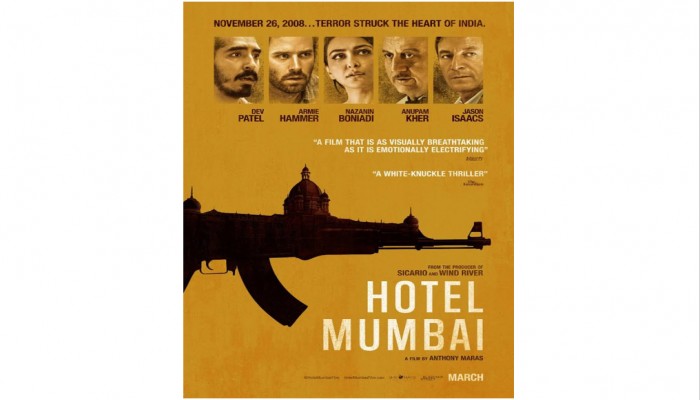Hotel Mumbai: A Reflection on the threat of Terrorism that India faces
- In Military & Strategic Affairs
- 09:15 PM, Apr 07, 2019
- Richa Yadav
“Truth is stranger than fiction, but it is because fiction is obliged to stick to possibilities; truth isn't.” Rightly said as truth can mesmerize, abhor, and even transport humans on a different level of comprehension of reality, especially if presented in an impactful way. Directed by an Australian, Mark Anthony, ‘Hotel Mumbai’ is one such film. A movie categorized as ‘thriller’ hits the audience profusely with its intense ‘realism’ and completely engages with the pace of the story as it unfolds.
Based on extensive research about a true story, the movie recreates the 2008 terrorist attack in Mumbai, in which militants from Lashkar-e-Taiba sieged Taj Mahal Palace Hotel. It plunges the viewers into a breath-taking grip of terror as few young perpetrators quietly invading the hotel premises, shooting the guests and staff members, and claiming about thirty lives in the chaos.
There is no central character in the movie and the narrative doesn’t hook to a particular perspective; there is an ensemble of multiple composite characters, who had been the first-hand witness or victim of the dreadful episode. It’s no one’s narration, but you witness human anxiety, fear, and thrill through different perspectives: from hotel employees, foreign tourists, soldiers, and also from the terrorists. And yet another perspective comes from the real news footage on background live TV telecast during the time when the incident happened in 2008. The director beautifully blends the real news clippings which not only help the audience comprehend the development of the story but also help the terrorist’s plan their next move.
The movie also experiments with symbolism: in one frame we see an infant’s innocent face, the very next shows guns and grenades; another frame covers a mutilated arm wrapped in blood and the very next takes the camera to depict colorful gourmet plates in the kitchen, all set to be served to the exclusive guests. The red thread on the wrist distinguishes the police from the perpetrators. The significance of turban as a part of one’s honor touches some sensitive cords but is handled well.
The film’s visuals are so striking that dialogues become redundant. Adding authenticity to the situation, the conversation happens in several languages like English, Hindi, Marathi, Punjabi, Arabic, Russian and Urdu, yet everything segues so well that you don’t feel the gaps which might have otherwise occurred with such experiment.
It is interesting to see how ‘God’ has such a major role in how we carve our attitude toward life. ‘Guest is God, so serve them immaculately’, reminds the chief chef of his credo to the hotel employees. And it does become the guiding principle for some employees who choose to risk their own lives to protect the guests. The development of the story reveals how ‘real heroes’ are not born but they are a natural outcome of circumstances.
But it’s a perspective. The complex human mind knows how to justify its propensities. ‘It is Jihad, an onslaught to serve Allah and paradise awaits you’ exhorts the mastermind ‘Brother bull’ who keeps giving direction to his trained terrorists in the hotel through the phone.
The callousness with which the terrorists operate in the name of God is palpable. There are some ironical and humorous moments to show how irrational the underlying motivation of the terrorists is. They staunchly believe it is ‘haram’ or prohibited touch a dead woman’s chest (while checking for her passport) or to taste pork, but how it is an honor to serve ‘allah’ by brutally killing kafirs!
The movie had its world premiere last year and was recently released in USA. Maras has written the screenplay with John Collee. Though he has previously directed a few critically-acclaimed shorts, this is his feature length film debut. There is no hesitance in precisely conveying the anti-India, anti-Hindu sentiment of the terrorists as it comes from the third person perspective. Audacious statements like ‘after so many years of this tragedy, the perpetrators of this attack are still roaming like heroes the streets on Pakistan’ could only be given by a foreign director in a most secular and a tone so humane.
The transnational cast is a treat to watch: Anupam Kher as chief chef, Dev Patel is impressive as dedicated staff, VIP guests such as Nazanin Boniadi as Zahra, Armie Hammer as her husband, and Jason Isaacs as a Russian businessman add to the authenticity of the story.
The luxury hotel set re-created in both Mumbai and Adelaide, Australia is magnificent; its opulence and elegance not only adds a lot of character to the work of art and convey a lot about the country’s architectural style.
The role of the Indian police and security force has been minimally represented. The local police squad appear clumsy, unimpressive, and no match to the terrorists.
The movie overwhelms. By the end, you feel you have been a little closer to history, a witness. On the end note, hope the movie doesn’t dissuade tourists to visit India.







Comments